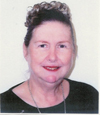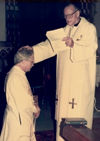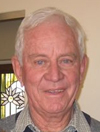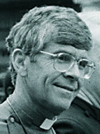Hurley and Ecumenism
The following interviews are with people who engaged with Archbishop Hurley in ecumenical and interfaith dialogue.
Paddy Meskin

Paddy Meskin is the National President of the SA Chapter of the World Conference on Religions for Peace. In this capacity she had many dealings with Archbishop Hurley especially in the last ten or so years of his life.In this edited extract from an interview with him, she reflects on his highly ecumenical spirit.
Rev Norman Hudson

Rev Dr Norman Hudson is a former bishop of the Methodist Natal Coastal District and chairperson of the Diakonia Council of Churches. One of his warmest memories of Archbishop Hurley's ecumenical spirit is the gentle, kindly and humorous way in which he replied to an elderly nun who in an ecumenical meeting asked the archbishop: "But do these other churches realise that we are the one true Church?" Dr Hudson recalls standing next to the archbishop in a poster protest and how calmly he accepted the harassment they received from some passersby. He was also very moved by the archbishop's enthusiasm about the Methodist "class system": small groups which encourage each other in Christian discipleship. This showed that willingness to learn from others was a significant feature of Denis Hurley's make-up. Dr Hudson was particularly struck by how strongly the archbishop encouraged the churches to work together in standing for justice - this would be a much more effective of encouraging church unity than harping on dogmatic differences.

Reverend Athol Jennings is a retired Methodist minister who now lives in Clarens in the Free State. A former Director of the Vuleka Trust, Headmaster of Waterford/Kamhlaba School in Swaziland and Head of the Methodist Christian Education and Youth Department, he had a number of associations with Archbishop Hurley over the years. In this interview he recalls inviting the archbishop in the early 1970s to share his idea of starting an organisation to be known as "Diakonia" with what was then known as the Natal Council of Churches. The archbishop's proposal was warmly accepted, and a few years later Diakonia (now the Diakonia Council of Churches) came into existence.
Bishop Michael Nuttal

Bishop Michael Nuttall is the retired Bishop of Natal, formerly Dean of the Church of the Province and therefore "Number Two to Tutu", a role which he described in a book of that title. In an interview of great ecumenical significance, Bishop Nuttall describes a few special occasions on which he was given communion by Archbishop Hurley - and speculates about how the Archbishop walked a tight line between his own personal loyalty to the Catholic Church and some issues where he had a different point of view. Among aspects of the archbishop's personality he notes a certain distance and shyness, also a disciplined lack of emotion, nevertheless a warmth and friendliness and a deep ecumenical commitment. He includes an interesting reflection on the pain of Anglican orders not being officially recognised by the Catholic Church, and recollects that at one time he wanted to ask the Archbishop whether he could attend a weekday Mass in the archbishop's chapel, just as a non-communicating participant - but didn't ever get around to asking if this would be possible.
Archbishop Philip Russell

Philip Russell was Desmond Tutu's predecessor as Anglican Archbishop of Cape Town. Prior to that he was Anglican Bishop of Natal, and had many dealings with Archbiship Hurley especially at the time of the establishment of Diakonia in the early 1970s. In this edited interview, Philip Russell recalls that Denis Hurley attended his consecration as Suffragan Bishop of Cape Town, his installation as Bishop of Natal and as Archbishop of Cape Town. They also both appeared as expert witnesses for the defence in the court martial of conscientious objector Charles Yeats. He sums up Denis Hurley in these words, "a very good, solid, gentle citizen, Christian, for whom I had the highest regard."